XIMIVOGUE Forecasting on Future Fashion Retail Trends
Author: Celia| Keywords chosen by Celia
Fashion retail trends are constantly evolving to reflect changing consumer preferences, technological advancements, and socio-economic factors.
In the ever-evolving world of fashion retail, staying one step ahead is not only a strategy, it's a necessity.
In this concise guide by XIMIVOGUE, we explore five fashion retail trends for 2024 that will help improve customer experience and skyrocket sales.
1. Glowing influence of social shopping
Consumers increasingly rely on social media for fashion inspiration and shopping in today's digital age. Platforms like Instagram and TikTok act as virtual catwalks where they analyze influencers' styles. They also look for ideas in user-curated boards on Pinterest and get advice from friends on Snapchat.
Influencers, celebrities, and brands collaborate to showcase products and offer exclusive offers through these platforms. This encourages user-generated content, strengthens the sense of community, and makes shopping more interactive and exciting.
Creating targeted ads allows you to highlight your products to the right customers. You can target customers based on demographics, interests, and previous purchases.

2. Rise of E-commerce
The advent of online shopping platforms has enabled consumers to browse and purchase their favorite products from the comfort of their homes.
E-commerce has given fashion brands and retailers a global reach and enabled them to connect with customers around the world. This has opened up new opportunities for businesses to expand their market presence and reach a wider audience.
Additionally, online platforms offer personalized shopping experiences through features such as virtual try-ons and AI-powered recommendations, improving the overall customer experience and driving sales growth for fashion retailers.

3. Immersive shopping experiences
The future of fashion retail is being revolutionized by the immersive power of augmented reality (AR) and virtual shopping experiences.
Imagine entering a virtual fitting room, browsing racks of clothes, and receiving styling tips from a virtual avatar.
For fashion retailers, immersive shopping experiences bridge the gap between the convenience of online shopping and the tactile experience of a brick-and-mortar store. This eliminates the need for sizing estimates and multiple returns, increasing customer satisfaction and reducing costs for retailers.

4. Metaverse becomes the major force
The metaverse, a collective virtual space that brings together augmented reality, virtual reality, and the Internet, has become a major force in the fashion retail industry.
Joining the metaverse will be one of the biggest trends in fashion retail in 2024, as the virtual world is the perfect channel to engage millennials and Gen Z like never before. By entering the metaverse, users can, among other things, try on clothing and accessories, buy virtual or real items, and visit brands' online showrooms.
This allows customers to explore and purchase products in a fully immersive environment, blurring the boundaries between the digital and physical worlds.

5. Effective engagement of Gen Z
The future of fashion retail depends on effectively engaging Gen Z, a digitally-enabled generation with strong shopping habits and values.
Gen Z is a true omnichannel generation, shopping wherever suits them best at the time and using whatever medium they choose to find what they want.
Pop-up shops with interactive elements, workshops focused on customization, and events with young designers are popular with this generation. The key is to create spaces that feel more like a shared experience, encouraging brand loyalty and promotion.


 Enjoy The Unexpected Power of XIMIVOGUE Star Shaped Accessories
Enjoy The Unexpected Power of XIMIVOGUE Star Shaped Accessories
 Grand Opening of XIMIVOGUE New Store in Muscat
Grand Opening of XIMIVOGUE New Store in Muscat
 Unleash Your Inner Icon The Power with XIMIVOGUE Tortoiseshell Accessories
Unleash Your Inner Icon The Power with XIMIVOGUE Tortoiseshell Accessories
 9 New Year Earrings That Speak Louder Than Fireworks
9 New Year Earrings That Speak Louder Than Fireworks
 2026 Chic Headbands For Preppy Girl Hair Looks
2026 Chic Headbands For Preppy Girl Hair Looks




